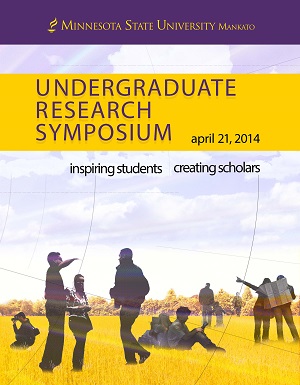Improving Students' Self-Efficacy in a Psychology Research Methods Course: An Enactive Mastery Experiences Approach
Location
CSU Ballroom
Start Date
21-4-2014 2:00 PM
End Date
21-4-2014 3:30 PM
Student's Major
Psychology
Student's College
Social and Behavioral Sciences
Mentor's Name
Moses Langley
Mentor's Email Address
moses.langley@mnsu.edu
Mentor's Department
Psychology
Mentor's College
Social and Behavioral Sciences
Description
The aim of this study was to assess whether students’ self-efficacy for research related skills could be improved by taking a course in research methods in psychology that purposefully incorporated mastery approaches identified as effective by the relevant literature. A research methods course was chosen because its core learning outcomes are highly representative of those held as core to the Psychology major itself. The data for this study were collected from 88 students at two state universities across five sections of the course during three semesters. Students completed a research methods self-efficacy survey once during the beginning of the semester and once during the end of the semester. On this survey, students rated their self-perceived skill on a scale of 1-5 (1 = not at all skilled, 5 = highly skilled) on six components of research methods in psychology. The data showed statistically reliable increases in students’ self-efficacy between the beginning and end of the semester in all six areas. The largest gains were observed in areas showing the lowest initial efficacy (i.e., using PsycINFO) and the smallest gains were observed in areas showing the highest initial efficacy (i.e., summarizing articles and interpreting statistics). We interpret these data as evidence that a research methods course in psychology can lead to increased academic self-efficacy for students in areas of core concern to the undergraduate Psychology major. The benefit of mastery approaches along with the utility and application of measuring academic self-efficacy during a research methods course is discussed in this poster.
Improving Students' Self-Efficacy in a Psychology Research Methods Course: An Enactive Mastery Experiences Approach
CSU Ballroom
The aim of this study was to assess whether students’ self-efficacy for research related skills could be improved by taking a course in research methods in psychology that purposefully incorporated mastery approaches identified as effective by the relevant literature. A research methods course was chosen because its core learning outcomes are highly representative of those held as core to the Psychology major itself. The data for this study were collected from 88 students at two state universities across five sections of the course during three semesters. Students completed a research methods self-efficacy survey once during the beginning of the semester and once during the end of the semester. On this survey, students rated their self-perceived skill on a scale of 1-5 (1 = not at all skilled, 5 = highly skilled) on six components of research methods in psychology. The data showed statistically reliable increases in students’ self-efficacy between the beginning and end of the semester in all six areas. The largest gains were observed in areas showing the lowest initial efficacy (i.e., using PsycINFO) and the smallest gains were observed in areas showing the highest initial efficacy (i.e., summarizing articles and interpreting statistics). We interpret these data as evidence that a research methods course in psychology can lead to increased academic self-efficacy for students in areas of core concern to the undergraduate Psychology major. The benefit of mastery approaches along with the utility and application of measuring academic self-efficacy during a research methods course is discussed in this poster.
Recommended Citation
Almoite, Maria; Zoe Martin; Monica Gee; and Jared Goelz. "Improving Students' Self-Efficacy in a Psychology Research Methods Course: An Enactive Mastery Experiences Approach." Undergraduate Research Symposium, Mankato, MN, April 21, 2014.
https://cornerstone.lib.mnsu.edu/urs/2014/poster_session_B/30




